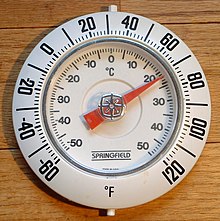ဖာရင်ဟိုက်
အပူချိန်၏ ယူနစ်
(°F မှ ပြန်ညွှန်းထားသည်)
ဖာရင်ဟိုက် (/ˈfærənˌhaɪt, ˈfɑːr-/) သည် အပူချိန်ကိုတိုင်းတာသည့် အပူချိန်စကေးအတိုင်းအတာတခုဖြစ်ပြီး ရူပဗေဒပညာရှင် Daniel Gabriel Fahrenheit ဆိုသူက ၁၇၂၄ ခုနှစ်တွင် အဆိုပြုခဲ့ခြင်းဖြစ်သည်။[၁] ယင်းအား ဒီဂရီ ဖာရင်ဟိုက် (သင်္ကေတ °F) အဖြစ် အသုံးပြုသည်။ မူလက ဖာရင်ဟိုက်စကေးတွင် လူ့ခန္ဓာကိုယ်ပျမ်းမျှအပူချိန်အား ၉၀ °F ဟု သတ်မှတ်ခဲ့သည်။ နောက်ပိုင်းတွင် ပိုမိုတိကျသည့် ၉၆ °F ဟု သတ်မှတ်ခဲ့သည်။[၂]
| Fahrenheit | |
|---|---|
 Thermometer with Fahrenheit (marked on outer bezel) and Celsius (marked on inner dial) degree units. | |
| ယူနစ်အချက်အလက် | |
| အတိုင်းအတာစနစ် | Imperial/US customary |
| ယူနစ်၏ | အပူချိန် |
| သင်္ကေတ | °F |
| အမည်ပေး | Daniel Gabriel Fahrenheit |
| ယူနစ် ဖလှယ်မှုများ | |
| 1 °F in ... | ... ညီမျှသည်မှာ ... |
| SI base units | 5/9(x +459.67) K |
| SI derived units | 5/9(x − 32) °C |
| absolute scale | x + 459.67 °Ra |
၂၀ ရာစုခေတ်ကာလအတော်များများတွင် ဖာရင်ဟိုက်၏ ရေ ခဲမှတ်ကို ၃၂ °F ဟူ၍လည်းကောင်း၊ ရေဆူမှတ်ကို ၂၁၂ °F ဟူ၍လည်းကောင်း ၁၈၀ °F အပိုင်းခြားဖြင့် သတ်မှတ်ခဲ့သည်။ ယခုအခါ ကယ်လ်ဗင် စကေးကို အသုံးပြုပြီဖြစ်သည်။[၃][၄]
ကိုးကား
ပြင်ဆင်ရန်- ↑ Balmer၊ Robert T. (2010)။ Modern Engineering Thermodynamics။ Academic Press။ p. 9။ ISBN 978-0-12-374996-3။ 17 July 2011 တွင် ပြန်စစ်ပြီး။
- ↑ "Fahrenheit temperature scale"။ Encyclopædia Britannica Online။ 25 September 2015 တွင် ပြန်စစ်ပြီး။
- ↑ "Busting Myths about the Metric System" (6 October 2020). Nist. United States National Institute of Standards and Technology.
- ↑ Appendix C – General Tables of Units of Measurement။ United States National Institute of Standards and Technology။ 7 January 2022 တွင် ပြန်စစ်ပြီး။